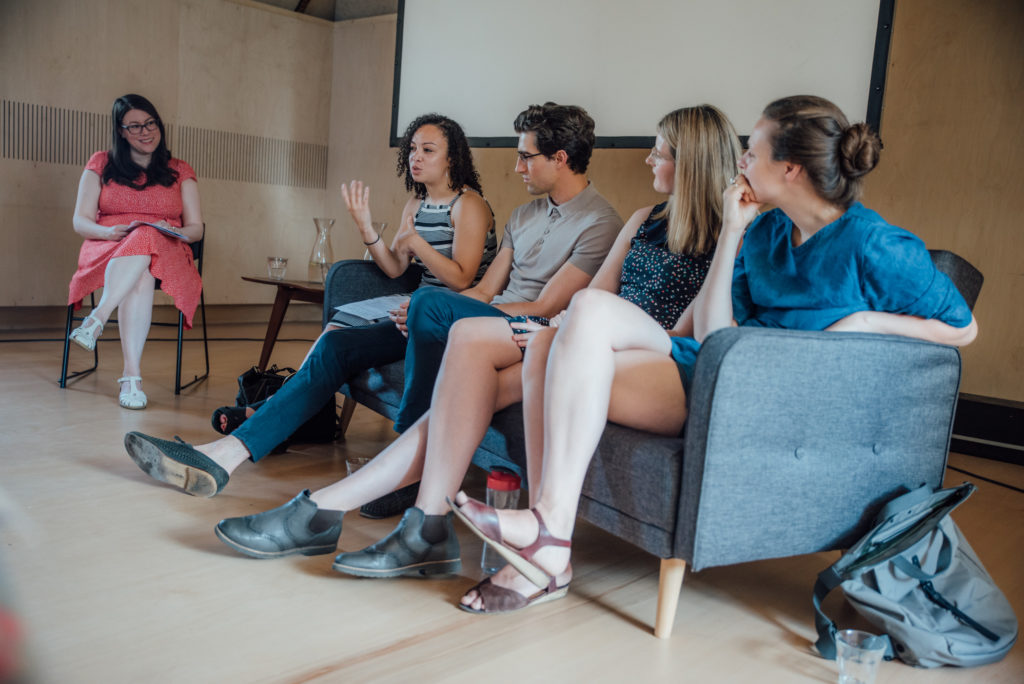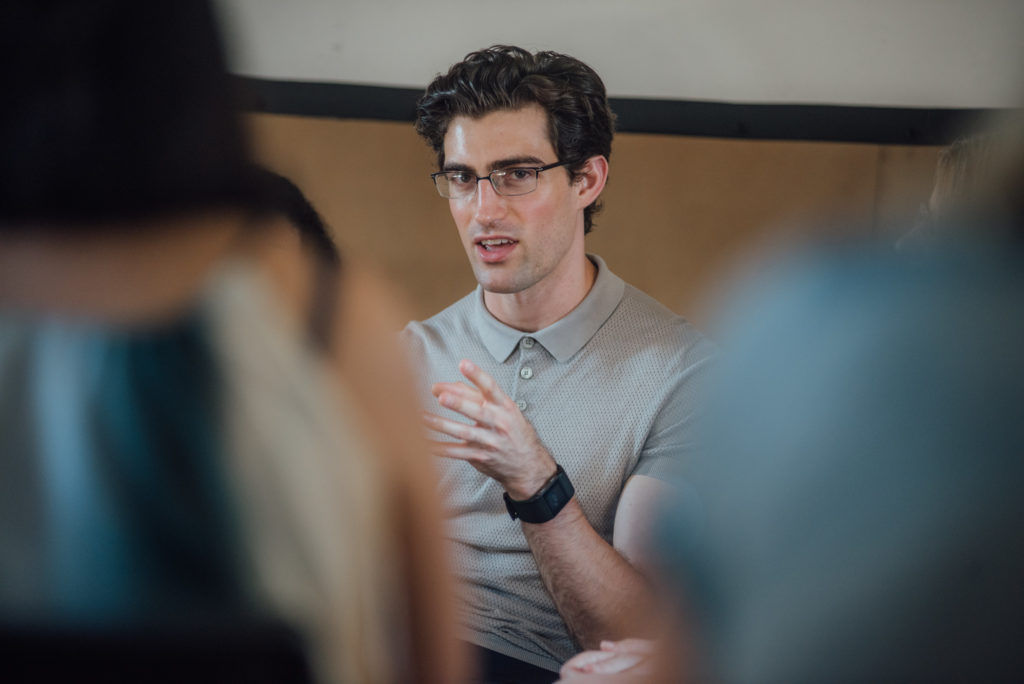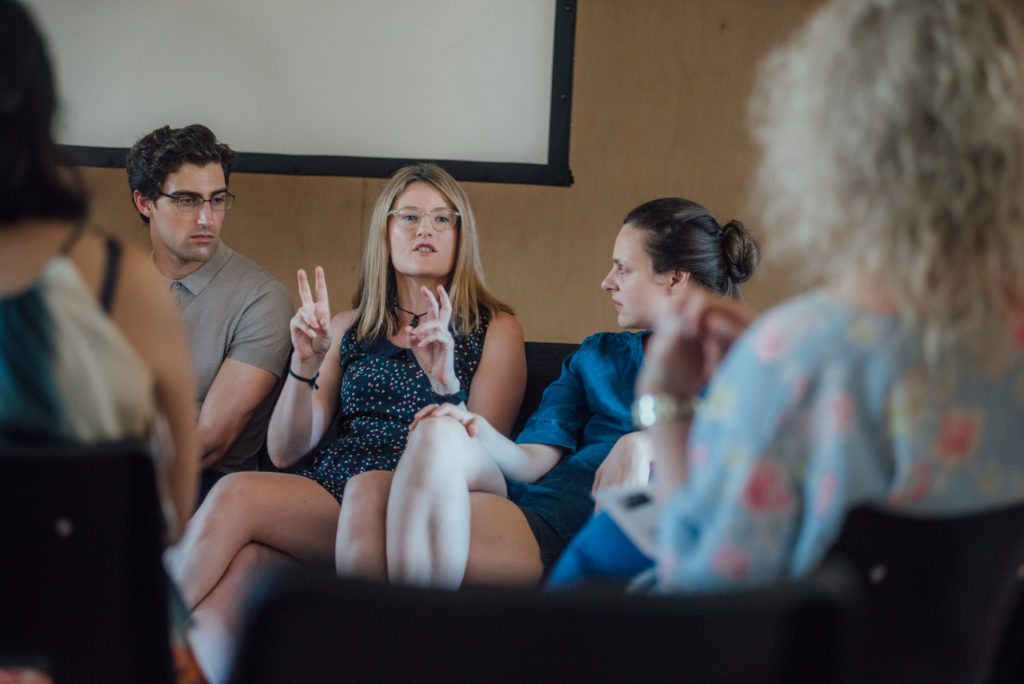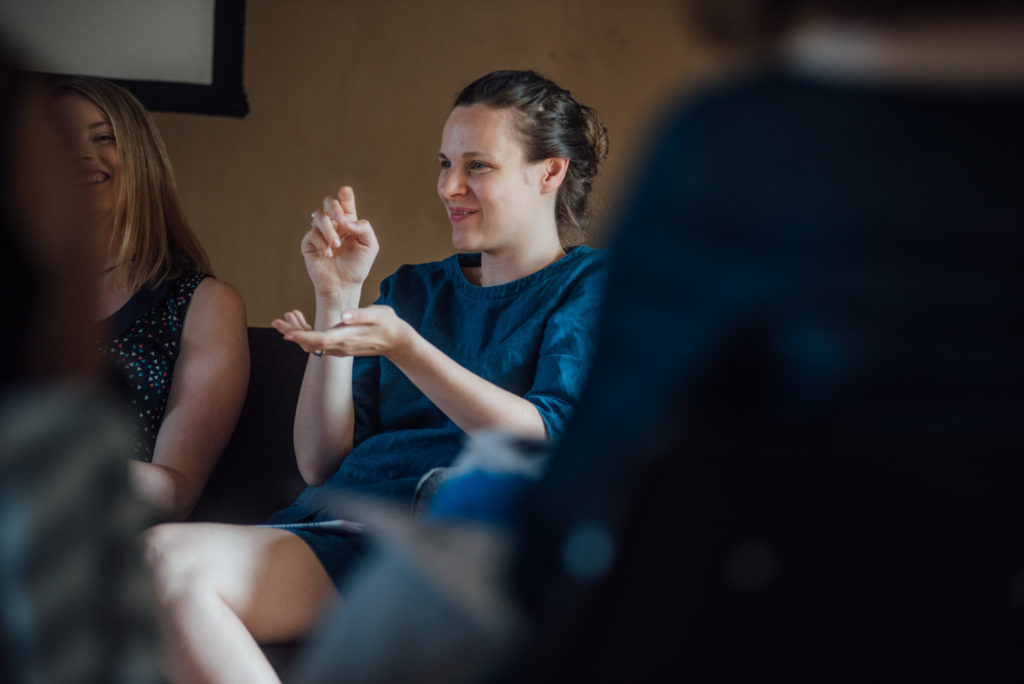LPB is delighted to welcome our new Editor Jennifer Richards, who kicks things off with this summary of our panel at London Writers’ Week! Want to know our panellists top tips for making work in the digital age? Read on…
The chance to go along to LPB’s panel on ‘Making Your Own Work In The Digital Age’ was just one of many firsts for me that day. It was also my first time at London Writers’ Week, and I was there to write my first piece for LPB as Editor (hi there!). But, most importantly, it was the first time that the idea of mixing the digital world with theatre didn’t leave me feeling like a terrified playwright.
The panel was held at Bush Theatre, chaired by our own A.C. Smith, and comprised actor, writer, producer and deviser Erin Siobhan Hutching; director and playwright Lynette Linton; live artist, playwright and PhD Deborah Pearson; and writer, digital producer and project manager Sam Sedgman. (Click here read more about their backgrounds and accomplishments.)

Considering the discussion changed a tech cynic like myself into someone who was soon scribbling ideas about screens, projections and captions into my notebook on the train home, it feels only fair to share the tips our brilliant panel gave on bringing the digital world to playwriting.
It’s all about language
Telling a playwright how important dialogue is will probably give you a (well-deserved) eye-roll, but language takes on an even bigger role when bringing the digital world to your performance.
Sam explained how, “most plays present conversations, but we don’t spend most of our life communicating through speech. In this day and age, we mostly interact through Instant Message.”

Luckily, you don’t have to design a production heavy stage to show that people are chatting through text or email, instead you can signify a change in the way your characters are communicating just by a shift in language.
Lynette added, “language is such a big part of it: the language you use as a person, the language you use via message, and the language you use on a blog, [helps] to see how those personas are different.”
This means if you’re a playwright without the budget for big production (and that’s probably most of us), you can instead convey everything you need to with words – a tool playwrights are usually much more comfortable with!
And your audience are likely used to digital language so will easily pick up on these changes. As Deborah explained, using the internet is like “tapping into a side of a brain that speaks another language”, so take advantage of that when you write.
Use social media correctly
Even if your play is not about the digital world in the slightest, chances are you’ll still be using digital tools when it comes to promoting your work.
Erin pointed out the benefits of social media, explaining how it means “reaching audiences that may not usually come to the theatre.” But it’s not about just shouting into the void of Twitter and Facebook by doing the odd post from your feed, you should instead be engaging with the people your show is targeted towards.

For Erin’s show People of the Eye, a semi-autobiographic performance about growing up with a deaf sister, this involved reaching out to people with hearing impairments who the show was designed for, with its use of creative captioning.
“Don’t be scared to break out of your circle”
This quote came from Lynette, which summed up perfectly a common theme from the panel discussion.

The theatre was not originally created as a digital space, which can put off playwrights like myself from trying to blend media and bring in the more technical side of things. But as Lynette’s production #Hashtag Lightie was about a video going viral, she couldn’t shy away from the technical side of things. Since using screens wasn’t Lynette’s expert field, she called on friends who were film makers to help her out.
Deborah also pointed out that when it comes to innovating as theatremakers, we can’t ignore the role other media have to play. The use of digital aspects, such as a screen, projections or other visuals can mean it’s “basically like making a film and piece of theatre at the same time” – this should excite us rather than scare us!
Only use what’s essential
Though AV elements were important in a lot of our panellists’ work, Sam argued for simplicity: “You don’t want to spend your time learning to be a software planner, so if it’s not important, don’t waste your time.”
Production can be expensive and impractical, with Erin reminding us that “when you are working with a show with a lot of projection, the projector is like a third performer, but a super grumpy one you can’t rely on!”
This doesn’t mean you should be reluctant to use digital tools, but just make sure, as Lynette said, “it’s about what’s essential for the story.” She added, “if the production needs technology as that makes it the best production, then that will happen.”
So what does an expanding digital world mean for playwrights?
It’s clear to see that the digital age is widening the scope of possibilities of what it means to create a performance.
Deborah even suggested that “since the internet, what audiences want out of theatre is changing”, with people craving the more immersive experience that AV tools can provide.

Making your own work in the digital age isn’t about trying to make the biggest production but the best one. You could even have a play about the digital world that involves no digital elements at all; simply use shifts in the characters’ language. It’s about what works for your story.
As I’m sifting through my (dog-eared) notebook, it’s clear that the panel’s discussion has given me the confidence to become a much more creatively brave playwright willing to embrace, rather than fear, the possibilities that the digital world can offer theatre.
Want to learn more about our panellists or see their work in performance? Click this link to read their bios, or check out the links below to follow them on social media or catch their upcoming work!
Erin Siobhan Hutching
Personal website: www.erinsiobhanh.com
Company website: www.thedeafandhearingensemble.
Twitter: @ErinSiobhanH
Erin’s play People of the Eye will be at the BAC and touring the UK from October 3017
Lynette Linton
Twitter: @LynetteLinton
Lynette’s play #Hashtag Lightie is now booking for its run at the Arcola in November
Deborah Pearson
Website: www.deborahpearson.com
Twitter: @shysecretagent
Deborah’s performance History History History will be at the Cameo Live in Edinburgh from 6-10 August
Sam Sedgman
Twitter: @samuelsedgman
Instagram: samsedgman
National Theatre podcast: nationaltheatre.org.uk/podcast
Sam hosts the National Theatre podcast, which can be found at the link above, on iTunes, or on your favourite podcast provider
Photos: David Monteith-Hodge


Pingback: Opportunities Weekly Round-up: 28 July 2017 | LONDON PLAYWRIGHTS' BLOG